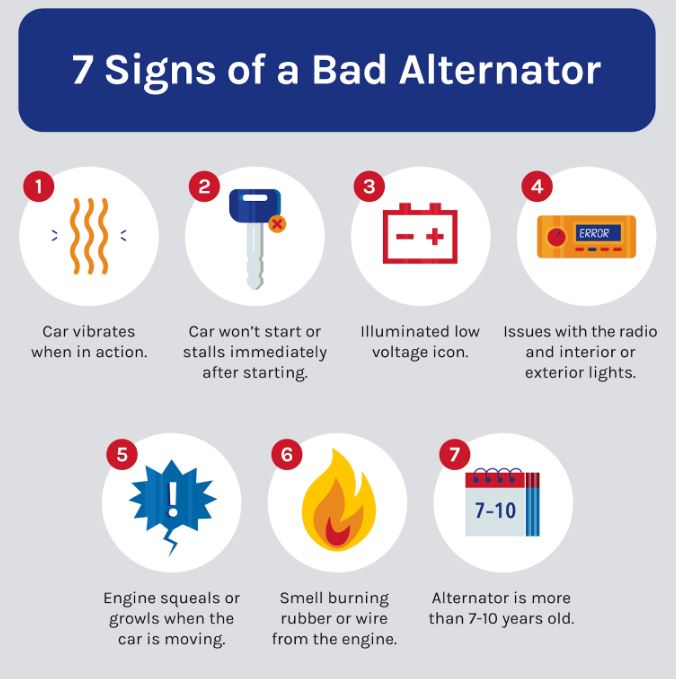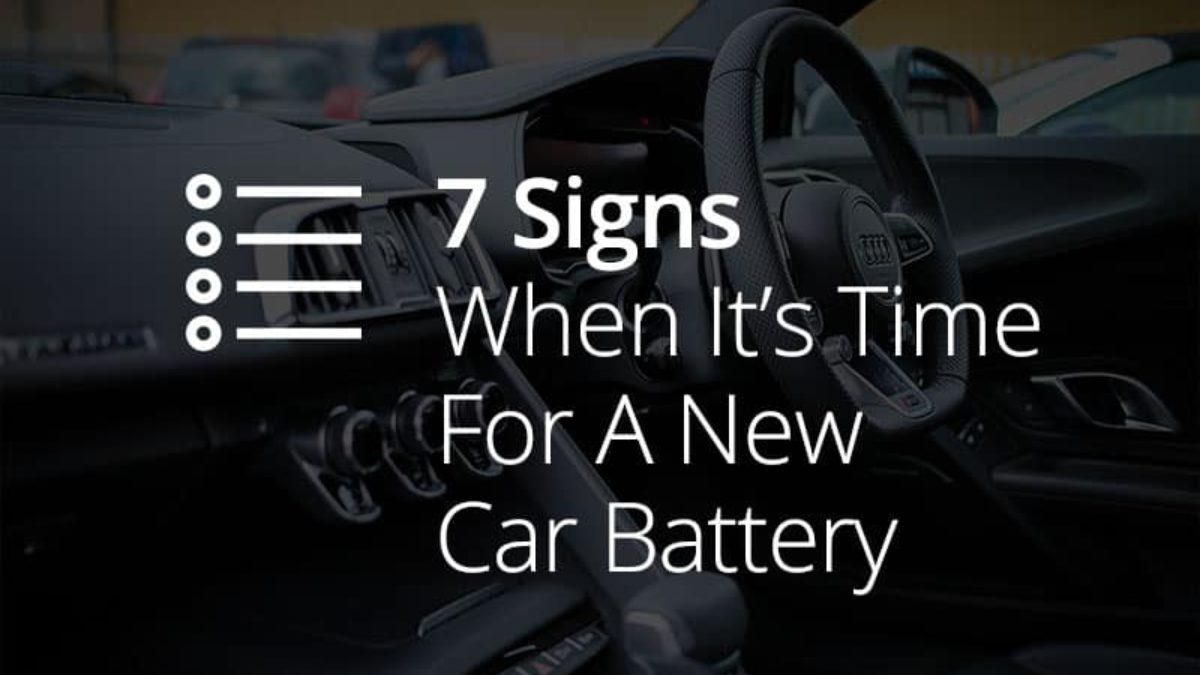7 Signs Your Vehicle’S Starter Motor Is Failing
If your vehicle’s starter motor is failing, you may notice signs such as slow cranking, clicking sound, or a grinding noise. In addition, your dashboard lights may dim, or you may experience intermittent starting issues, a burning smell, or visible damage.
These signs indicate a potential problem with the starter motor, and it’s important to address them promptly to avoid getting stuck in a non-starting vehicle. Your car’s starter motor plays a crucial role in getting the engine running, and when it starts to fail, it can lead to frustrating and inconvenient issues.
It’s essential to be aware of the signs that indicate a potential problem with the starter motor, so you can take the necessary steps to address the issue before it leads to a complete breakdown. We’ll explore seven common signs that may indicate your vehicle’s starter motor is failing, and what you can do to resolve the issue effectively.

Credit: www.aaa.com
Common Signs Of A Failing Starter Motor
If you’re experiencing issues starting your vehicle, it could be a sign that your starter motor is failing. The starter motor plays a crucial role in the ignition process, spinning the engine to get it running. When it starts to fail, there are several common signs you should be aware of so that you can address the problem before it worsens. By understanding these signs, you can potentially save yourself from being stranded on the side of the road. Let’s take a closer look at some of the most common signs of a failing starter motor.
Strange Noises
One of the most noticeable signs of a failing starter motor is strange noises coming from your vehicle. These noises can range from grinding and clicking sounds to high-pitched whirring or screeching. If you hear any of these noises when you try to start your car, it’s a clear indication that something is wrong with the starter motor.
Intermittent Starting Issues
Another sign of a failing starter motor is intermittent starting issues. You may find that your vehicle starts fine one day and then struggles to start the next. This inconsistency can be frustrating and can indicate a problem with the starter motor. If you’re experiencing this issue, it’s important to get it checked out as soon as possible to avoid being stranded unexpectedly.
Clicking Sound
A clicking sound when you turn the key in the ignition is another common sign of a failing starter motor. This clicking sound usually indicates that the starter motor is not receiving enough power to engage and spin the engine. If you hear this sound, it’s a good idea to have your starter motor inspected by a professional to determine the cause and prevent further damage.
Being aware of these common signs of a failing starter motor can help you address the issue proactively. Keep an ear out for strange noises, pay attention to intermittent starting issues, and listen for clicking sounds. If you notice any of these signs, it’s best to get your starter motor checked by a qualified mechanic. By taking care of the problem early on, you can avoid costly repairs and keep your vehicle running smoothly.
Electrical Problems Associated With A Failing Starter Motor
When a vehicle’s starter motor is failing, it can cause various electrical problems that can be frustrating and costly to fix. It’s essential to be aware of these issues so that you can address them promptly and avoid further damage to your vehicle. Here are some common electrical problems associated with a failing starter motor.
Flickering Lights
If you notice flickering lights in your vehicle, it could be a sign of a failing starter motor. The inconsistent power supply from the malfunctioning starter motor can cause the lights to flicker or dim, indicating an underlying electrical issue.
Battery Drain
Experiencing battery drain unexpectedly can be linked to a failing starter motor. When the starter motor fails, it may draw excess power from the battery, causing it to drain rapidly. This can result in difficulty starting your vehicle and may require frequent jump starts.
Effects Of A Faulty Starter Motor On Vehicle Performance
When your vehicle’s starter motor begins to fail, it can have a noticeable impact on your vehicle’s overall performance. Understanding the effects of a faulty starter motor on your vehicle can help you identify potential issues early and avoid being left stranded with a non-starting vehicle. Here are some signs to watch out for that indicate your starter motor may be failing.
Delayed Engine Cranking
If you notice that your vehicle is taking longer than usual to start or if it cranks very slowly, it could be a sign of a faulty starter motor. Delayed engine cranking is often a result of the starter motor not receiving enough electrical current to operate properly. This can be caused by a weak battery, corroded connections, or a worn-out starter motor itself.
Inability To Start The Engine
One of the most obvious signs of a failing starter motor is the inability to start the engine altogether. When you turn the key, and nothing happens, or you only hear a clicking noise, it’s likely that the starter motor has failed. This can be a frustrating experience, especially if it happens unexpectedly, leaving you stranded and unable to drive your vehicle.

Credit: www.birchwoodcredit.com
Diy Troubleshooting For Starter Motor Issues
Gain insight on DIY troubleshooting for starter motor issues through identifying 7 common signs of potential failure in your vehicle. Tips for detecting problems early and proactive maintenance to avoid unexpected breakdowns are discussed for optimal vehicle performance and reliability.
Check The Battery Connections
If you’re experiencing issues with your vehicle’s starter motor, it’s essential to perform some DIY troubleshooting before heading to the mechanic. One of the first areas to inspect is the battery connections. Faulty battery connections can prevent power from reaching the starter motor, resulting in difficulty or failure to start your vehicle. You can easily check the battery connections yourself with just a few simple steps.
Inspect The Starter Solenoid
Another component of the starter motor system that may be causing issues is the starter solenoid. The solenoid is responsible for engaging the starter motor when you turn the ignition key. If it is malfunctioning, it can prevent the starter motor from receiving power and functioning correctly. To ensure the starter solenoid is working properly, follow these steps to inspect and troubleshoot any potential problems.
When To Seek Professional Help For Starter Motor Problems
When to Seek Professional Help for Starter Motor Problems
Consulting A Mechanic
If you notice these signs:
- Grinding noise when starting
- Intermittent starting issues
- Smoke coming from the starter
Replacing The Starter Motor
When to consider replacing:
- Multiple failed starting attempts
- Burning smell during starts
- Starter motor not engaging consistently

Credit: www.firestonecompleteautocare.com
Frequently Asked Questions On 7 Signs Your Vehicle’s Starter Motor Is Failing
What Are The Signs Of A Faulty Starter Motor?
Faulty starter motor signs include clicking noises, engine not starting, grinding sounds, and electrical issues like dimming lights.
How Do You Check If A Starter Is Good Or Bad?
To check if a starter is good or bad, first, listen for a clicking sound when turning the key. Then, inspect the battery, wiring, and connections for any damage. Lastly, use a multimeter to test the starter for proper voltage.
How Do I Know If My Starter Or Ignition Is Bad?
If your car doesn’t start, it could be a sign of a bad starter or ignition. Listen for clicking noises, check the battery and cables, and look for any warning lights on the dashboard. If these signs are present, it’s best to have a professional inspect it.
What Is The Biggest Cause Of Starter Motor Failure?
The main cause of starter motor failure is usually due to worn out or damaged components, such as the armature, solenoid, or brushes.
Conclusion
It is important to be aware of the signs of a failing starter motor. From slow cranking to grinding noises, these indicators can save you from unexpected breakdowns. Regular maintenance and prompt identification of issues will help prolong the life of your vehicle.
Remember to consult a professional if you notice any of these warning signs. Stay proactive and ensure your vehicle’s starter motor is functioning properly for a smoother driving experience.


